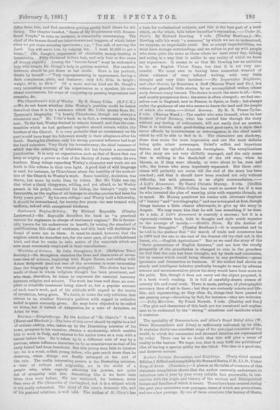NOVELS.—Dimplethorpe. By the Author of "St. Olave's." 3 vols. (Horst
and Blackett.)—The hero of this novel should by rights boa lad of artistic ability, who, taken up by the Dissenting minister of his town, prospers in his vocation, obtains a Studentship, which enables him to work in Italy, and returns to his native town as a man with a career before him. He is taken up in a different sort of way by a partner, whose influence threatens to be as mischievous as that of his early friend had been beneficial. But this young man fails to interest us; ho is a weak, selfish young follow, who gets much more than he deserves, when things are finally arranged at the end of the tale. The really interesting person is the Dissenting minister, a man of culture and originality, set in the midst of a people who, while vaguely admiring his powers, are quite out of sympathy with him. Something like it we have seen more than once before. We are reminded, for instance, more than over of The Chronicles of Carlingford, but it is a subject which is not easily exhausted. The story of the man's domestic life, and of his pastoral relations, is well told. The author of St. Olave's has a turn for ecclesiastical subjects, and this is the best part of a book which, on the whole, falls below its author's reputation.—Thador St. Paul's. By Richard Dowling. 3 vole. (Tinsley Brothers.)—Mr. Dowling calls his work " a romance.," by which we aro to understand, we suppose, an improbable novel. But to accept improbabilities, we must have strange surroundings, and we refuse to put up with people who BOOM quite the same as those whom we meet every day, talking and acting in a way that is unlike to any reality of which we have any experience. It seems to us that Mr. Dowling has an ambition to be an English Victor Hugo, but that it is not very suc- cessful. We must own to having been somewhat wearied of three volumes of very inflated writing, with very little thought and very little incident.—My Imperialist Neighbour, and other Stories, by Henrietta A. Duff (Marcus Ward and Co.), is a volume of graceful little stories, by an accomplished writer, whose early decease many lament. The theme is much the same in all,—love, and mostly prosperous love ; the seems is often changed ; we find our- selves now in England, now in France, in Spain, in Italy ; but always under the guidance of one who seems to know the land and the people of which She writes.—Grissl Romney. By M. E. Fraser-Tytler. 2 vols. (Marcus Ward.)----The reader who asks himself, when he has finished Grisel Romney, what has carried him through the story without any feeling of tediousness, will not easily find an answer. That it is written with good-feeling and good-taste, in a style that never offends by incorrectness or extravagance, is the chief merit which ho will be able to find in it. The characters are shadowy, those that make the most impression and are the most definite being quite minor personages, Grisel's selfish and imperious father, and the spiteful Augusta Yerninghem. The complications of the story are not very skilfully managed, and the only scene that is striking is the death-bed of the old man, when ho blesses, as if they were already, or were about to be, man and wife, the lovers who seem hopelessly separated. But these criti- cisms will probably not occur till the end of the story has been reached ; and that it should have been reached not only without difficulty, but with pleasure, is no slight commendation.— A Life's Atonement. By David Christie Murray. 3 vols. (Griffith and Farran.)—Mr. Wilkie Collins has much to answer for, if it was be who invented the plan of weaving plots with separate threads, so to speak. Mr. Murray perplexes his reader with alternate chapters of " history" and " autobiography," and one is tempted at first, though things become a little clearer afterwards, to give up the story in despair. We may warn him that he will lose something if he does. As a tale, A Life's Atonement is scarcely a success; but it is a vigorously-written book, both in thought and style much superior to the average of novels.—Stalrblo Farm. By the Author of "Earnest Struggles." (Tinsley Brothers.)—It is somewhat sad to be told in the preface that " the march of trade and commerce has in 1879 laid the axe to the root of the dearest old ivy-clad oak in the forest, viz.,—English Agriculture." But as we read the story of the " three generations of English farmers," and see hew the steady prosperity of the grandfather is changed to ruin in the grandson wo find that the ruin has been wrought, not by trade and commerce, but by causes which would bring disaster in any profession,—gross ignorance and inattention to business. If the author had shown us steady and intelligent industry gradually brought to want by adverse seasons and unremunerative prices his story would have been more to the point. But, though it does not carry out the object proposed, it is a book worth reading. It is full of carefully-drawn scenes of country life and rural work. There is more, perhaps, of photographic accuracy than of art in them ; but they are curiously minute and life- like, and representing, as they often do, things that have passed or are passing away—threshing by flail, for instance—they are welcome —Folly Morrison. By Frank Barrett. 9 vols. (Bentley and Son.) —The plot and characters of this book are too unnatural and unplea- sant to be redeemed by the " strong " situations and incidents which it contains.


































 Previous page
Previous page